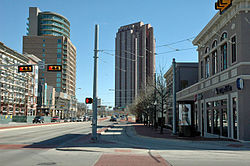Uptown, Dallas
| Uptown Dallas | |
|---|---|

Looking east along Blackburn Street in Uptown
|
|
| Country | United States |
| State | Texas |
| Counties | Dallas |
| City | Dallas |
| Area | |
| • Water | 0 sq mi (0 km2) 0% |
| Elevation | 472 ft (144 m) |
| Population (2014) | |
| • Total | 19,979 |
| ZIP code | 75201, 75204 |
| Area code(s) | 214, 469, 972 |
| Website | www |
Uptown is a PID (public improvement district) and an upscale neighborhood in Dallas, Texas. Uptown is north of and adjacent to downtown Dallas, and is bordered by US 75 (Central Expressway) on the east, N Haskell Avenue on the northeast, Katy Trail on the northwest, Bookhout Street and Cedar Springs Road on the west, N Akard Street on the southwest and Spur 366 (Woodall Rodgers Freeway) on the south.
Uptown is one of the most pedestrian-friendly areas in all of Texas. It is largely "new urbanist" in scope; the majority of facilities considered "Uptown institutions" are relatively new and were created during the late 20th and early 21st Centuries' new urbanist urban planning movement. Popular with young professionals, multi-use development is the norm and an increasingly pedestrian culture continues to thrive.
The now-upscale Uptown area was originally outside the city limits of Dallas, and was home to those not welcome in the city. The west side, near present-day Harry Hines Boulevard, once hosted a large Hispanic neighborhood known as Little Mexico. The east side, now anchored by Cityplace Center, was the site of the Freedmen's Town established by freed African-American slaves. Very little of this working-class history remains, with the Hispanic west being turned into high-rise buildings, and the African-American east being destroyed by the construction of Central Expressway and Woodall Rodgers Freeway. All that remains of Freedmen's Town is the Freedmen's Cemetery, which gained national recognition when Central Expressway reconstruction revealed over 1,100 graves beneath existing and proposed roadways.
...
Wikipedia
